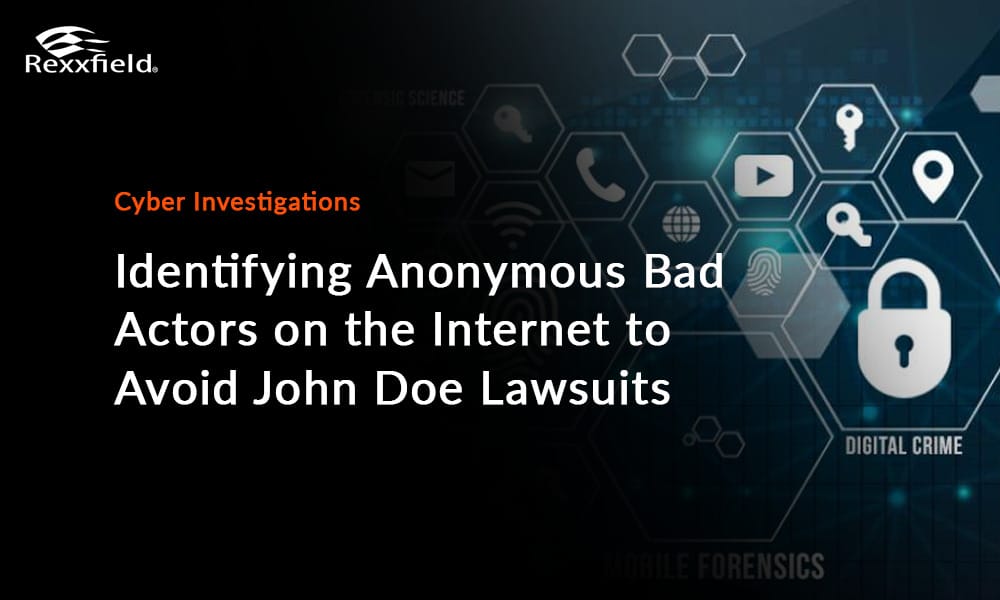In the digital age, the anonymity afforded by the internet has given rise to a multitude of online crimes, including defamation, harassment, and cyber scams. These acts can have devastating effects on individuals and businesses alike. The challenge lies in identifying the anonymous perpetrators and holding them accountable for their actions. That’s where our team at Rexxfield Cyber Investigation Services comes in.
Identify Anonymous Bad Actors on the Internet
Since 2008, our team of cyber and digital forensic investigators has worked on hundreds of cases, both civil and criminal, offering our clients the necessary expertise and support. Our investigations have spanned jurisdictions globally, providing a comprehensive understanding of the legal landscape and evidence collection requirements.
With our experience and expertise in cyber investigations, we specialize in unmasking the anonymous internet users who operate behind disposable phone numbers, social media accounts, and email addresses. Our services cater to a wide range of cases, including online defamation, extortion, cyber harassment, nonconsensual pornography, and more. We even provide defense support for clients falsely accused of cybercrime.
Our Evidence is Lawful, Admissible, and Compelling
At Rexxfield, we pride ourselves on employing lawful methods to gather compelling digital evidence. Our team is adept at navigating complex digital trails to identify the offenders responsible for the online crimes. The evidence we uncover is not only admissible in court but also persuasive, supporting the pursuit of justice on behalf of our clients.
How Quietly Identifying Anonymous Antagonists Helps in Court
By partnering with our team, you can gain numerous advantages in your legal proceedings:
Streamlined Litigation Timeline: Our ability to identify the online bad actor means you can bypass the need to issue subpoenas, which significantly truncates the litigation timeline. This approach minimizes delays and avoids the resistance often associated with “John Doe” or “Jane Doe” lawsuits, giving you a competitive edge in court.
Strengthened Position in Court: By naming and unmasking the offender with our compelling evidence, you provide your client with a strategic advantage. Not only does this help establish perjury if the offender is unaware of our evidence, but it also strengthens your client’s position in court, supporting their claims and increasing their chances of success.
Cost-Effective Solutions: Working with us can save your client money. By bypassing lengthy legal processes and focusing on targeted investigation, we eliminate unnecessary expenses associated with subpoenas and potential legal hurdles. This cost-effective approach allows you to allocate resources more efficiently and deliver value to your clients.
Why Prevent John Doe Lawsuits in Cyber Cases
The United States has very robust free speech laws; individuals have the right to criticize another while using an anonymous pseudonym to hide their identity, but only if the criticism is truthful. Parody humor is also protected speech, even if it crosses over into fiction in many cases. If the person who is being criticized claims that the criticism is untrue, he or she can initiate a “John of Jane Doe” defamation lawsuit, but where anonymous criticism is involved, the lawsuit can be long and expensive. The author of the defaming publications is permitted to hire legal representation, while still maintaining their anonymity. The legal burden is on the injured person to prove the criticism is untrue, and for public personalities, that the allegations are both (1) untrue, AND (2) malicious, i.e. that the author knew the statements were untrue.
If the plaintiff is unable to prove the statements are untrue, then the judge can not only dismiss the case while protecting the author’s identity, but can also order that the plaintiff pay the anonymous defendant’s legal fees.
Rexxfield can usually unmask an anonymous bad actor without their knowledge. This can give an injured party a considerable advantage in court because:
- it allows the defendant to be named in a lawsuit, thus avoiding the problems with a “Doe Lawsuit“
- If the defendant denies the authorship under oath, he or she can be held in contempt of court for perjury when Rexxfield’s evidence is admitted.
Subpoenas & Electronic Discovery Requests
In legal proceedings involving Internet Service Providers (ISPs), Phone Carriers, Email Providers, and other entities, judges often approach the issuance of production orders cautiously to avoid potential conflicts with First Amendment rights. At Rexxfield, we understand these concerns and specialize in preparing subpoena addendums that address them comprehensively. Our decades of experience have allowed us to develop a practice that minimizes ambiguities, deficiencies, and resistance from both defendants and the ISPs being served with document production requests. By employing precise technical language and leaving no room for misinterpretation, we ensure the effective acquisition of crucial information without unnecessary delays or loss of evidence.
Many judges are hesitant to issue production orders for Internet Service Providers (ISPs), Phone Carriers, Email Providers, etc. for fear of treading on the first amendment. Our investigators can ghostwrite detailed subpoena addendums that clearly articulate a plain language description of the requested records; we have even successfully obtained ex parte orders against Google for record production that others have had to fight for over many months and without success. We leave no stone unturned when it comes to the precise technical language for the production requests so that the ISPs or other providers will not withhold crucial information due to deficient or ambiguous subpoena preparation.
Through decades of experience, we developed a practice of using language that avoids ambiguities, deficiencies, and resistance for either the defendants or the carriers/providers being served with the document production requests. These errors may require recasting the documents and the loss of important evidence. We can interpret evidence obtained in production requests, interrogatory responses, and deposition transcripts of parties and witnesses. Our team also assists with strategic and tactical issues including the preparation of depositions and interrogatory questions.
Section 230(c) and free speech precedent
Section 230(c) of the Communications Decency Act protects the platforms from defamation, only the author is liable.


